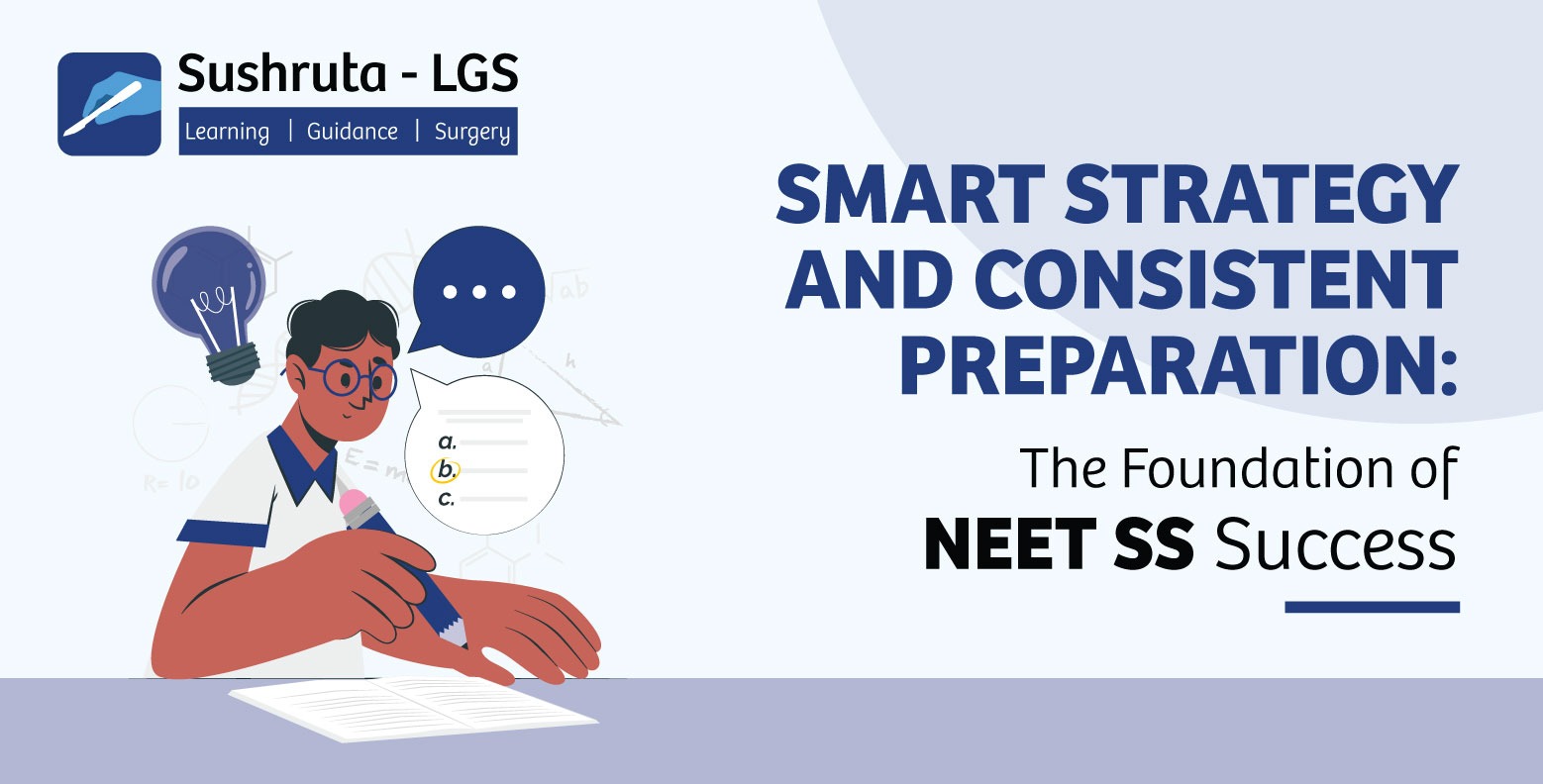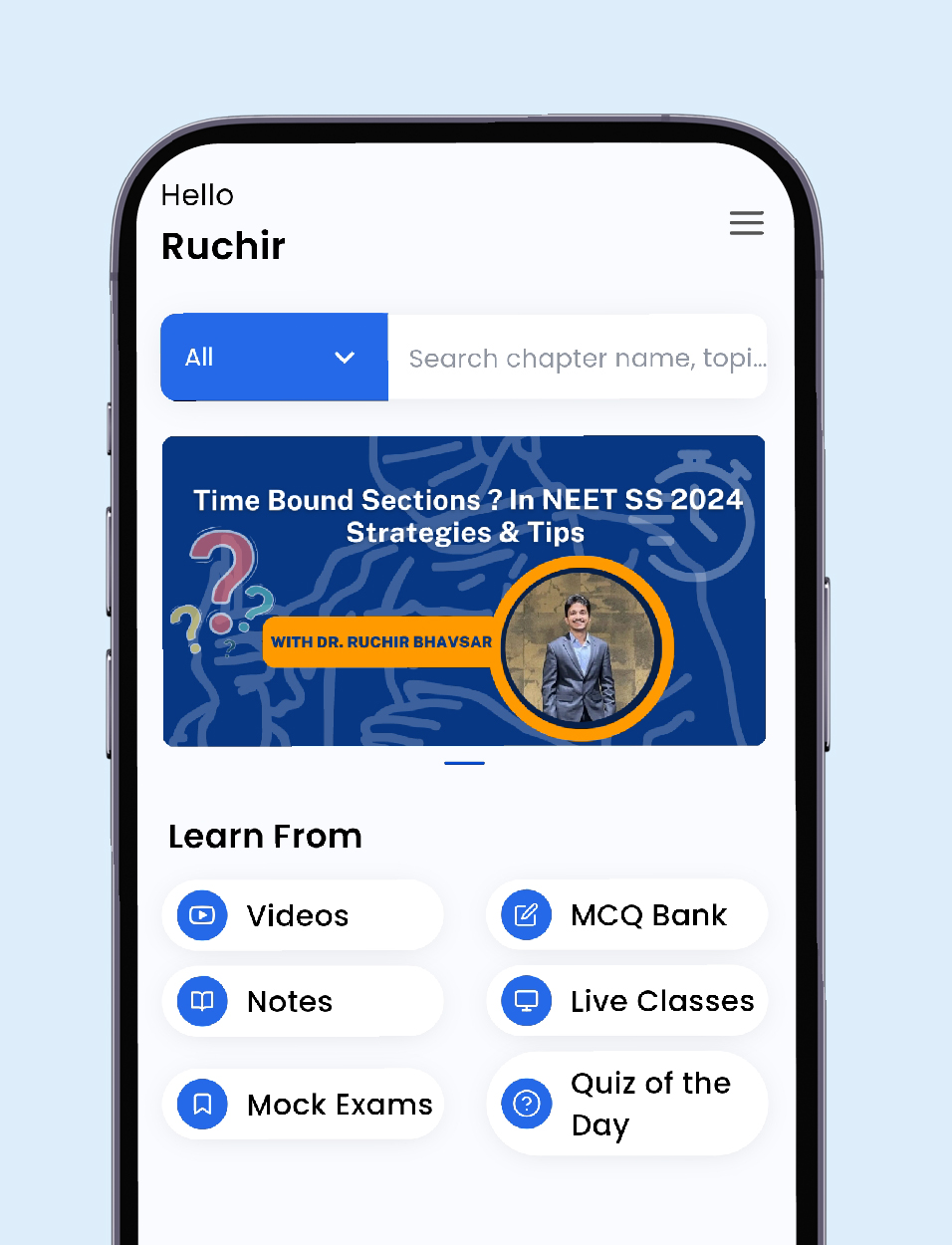Success in NEET SS does not stem from rote learning or endless cramming of textbooks. It is born out of smart strategy and unwavering consistency. I will now discuss how to prepare effectively—beyond conventional study—and share our structured approach at Sushruta LGS.
When I began my own preparation during MS, I had chosen GI Surgery—one of the most competitive specialties with limited seats. My journey stretched over three years, especially through the COVID period, but I eventually realized that NEET SS preparation is not a sprint—it is a marathon. Consistency is the key that takes you to the finish line.
Balancing Residency and Preparation
I completely understand the struggle of balancing MS duties and NEET SS studies. It is challenging, but not impossible. If you are sincere and consistent, success is attainable. Let us now understand the structure and evolving pattern of the NEET SS examination.
Understanding the NEET SS Exam Pattern
The NEET SS exam now comprises 150 questions, divided into three time-bound sections of 50 questions each, with 50 minutes per section. You can move to the next section only after completing the previous one. This change emphasizes time management and focused practice.
As for preparation sources, earlier years saw selective reading, but that is no longer sufficient. Today’s NEET SS exam has evolved into a clinically oriented, reasoning-based paper. Therefore, you must study all three textbooks thoroughly—Bailey & Love, Sabiston, and Schwartz. Each forms an indispensable part of your preparation.
The Evolving Competition
Back in 2020, about 6,500 candidates appeared for NEET SS. By 2024, that number rose to 8,000, and this year, it is expected to reach around 9,500 due to an increase in FNB seats and repeaters. The takeaway? Every mark counts. In such fierce competition, strategy is what differentiates toppers from the rest.
Why Strategy Matters More Than Study Hours
All aspirants study similar material. What separates top performers is how they strategize, analyze, and adapt. Random study and haphazard MCQ solving will not yield ranks. You need structured, disciplined preparation. The toppers regularly analyze mistakes, identify weaknesses, and refine their method.
Practice and Revision: The Game Changers
Reading alone will not help; practice and revision form the backbone of your preparation. Under exam pressure—when you have just one minute per question—your brain depends on what you have revised and retained. Repetition helps your recall accuracy and can improve your correct responses by over 80%.
Fixing Your Sources Early
One of the most common mistakes aspirants make is changing sources frequently—switching between apps or platforms mid-preparation. This leads to fragmentation and poor consolidation. The golden rule is:
Fix your study sources on Day 1 and stick to them. Master and revise them multiple times instead of collecting endless material.
Building a Six-Month Roadmap
Prepare a six-month study roadmap. Even if you can study just 30–60 minutes daily during your residency, consistency is more important than duration. Start small; build the habit. Gradually, you’ll be able to sustain longer, focused study hours.
Quality Over Quantity: Study Less, Retain More
Studying 12 hours a day without retention is futile. Even if you study 4–6 hours effectively and revise strategically, that is far more productive. Your goal should be quality reading, where even a week later you can recall key points accurately. Retention, not duration, determines results.
The Read–Revise–Test Cycle
At Sushruta LGS, I recommend a simple but effective cycle:
-
Read the textbook thoroughly—the base material.
-
Revise after one week.
-
Solve MCQs on the same topic immediately after revision.
For example, if you study breast surgery today, solve its MCQs after a week to evaluate recall and comprehension. This cycle helps identify weak areas and improves long-term retention.
Smart Reading and Logical Thinking
Avoid cramming. Think logically and conceptually. When studying, imagine yourself as the examiner—ask, “What question could I frame from this topic?” This reflective approach strengthens understanding.
Always analyze your accuracy. Don’t just note your score; understand why you got questions wrong. Improvement lies in dissecting those errors, not ignoring them.
The Role of Notes
Your notes are your personal revision weapon. Whether handwritten or printed, they should not just be reproductions of textbooks. Notes are memory shortcuts—compact, visual, and easy to revise. Flowcharts, diagrams, mnemonics, and highlighted boxes improve visual memory, which is crucial for surgical super-speciality exams.
At Sushruta LGS, we’ve invested significant effort in creating consolidated notes that merge all three textbooks—Bailey, Sabiston, and Schwartz—into a structured, point-wise format. These notes include theory sections, mnemonics, flowcharts, and revision boxes, designed for rapid final revision.
Managing Time Between OT, Wards, and Study
A major challenge for surgical residents is balancing OT, ward duties, and study time. Even a daily 30–60 minutes of focused progress takes you far. Use small breaks productively—solve MCQs or review notes instead of scrolling through social media. With disciplined micro-sessions, cracking NEET SS is achievable even alongside your MS duties.
Common Mistakes That Cost Ranks
A recurring pattern among NEET SS aspirants is the lack of structured revision. Many students read daily—perhaps a few chapters from Bailey or Sabiston—and feel that they’ve completed sufficient preparation. However, reading once is not enough. Repetition and revision are what solidify knowledge. Without these, even the most extensive reading loses its value.
Another common pitfall is the indiscriminate use of multiple study materials. Students often collect content from friends or various platforms, thinking that reading more sources will cover more ground. In reality, it only causes confusion and hampers consolidation. My advice is clear: even if you have access to 3–4 resources, limit yourself to one or two trusted sources and master them thoroughly. Avoid the fear of missing out (FOMO)—you don’t need to read everything to rank; you need to read the right things, consistently.
The Sushruta LGS Approach: Mentorship Beyond Coaching
During my own preparation, I found that structured mentorship was missing. While resources and question banks were available, there was no personalized guidance on how to study, what to focus on, and how to analyze mistakes. That gap inspired the creation of Sushruta LGS—a platform built not just for coaching, but for mentorship.
At Sushruta LGS, our approach emphasizes:
-
Critical reasoning over rote memorization.
-
A focused approach with clarity of concept and direction.
-
Systematic revision of mock exams.
-
Continuous performance tracking and feedback.
We conduct nearly 15 full-length mock exams, each meticulously designed to simulate real NEET SS conditions—time-bound, clinically inclined, and reasoning-driven. These are not just practice tests but analytical tools that help students evaluate accuracy, identify knowledge gaps, and strengthen weak areas.
Lessons from Our Toppers
On our YouTube channel, you can find interviews with NEET SS 2023–24 toppers, and they all echo a common message. Despite different study patterns, every successful aspirant followed these four principles:
-
Revision — multiple, smart, and time-bound.
-
Strong conceptual foundation — focusing on understanding the why behind every topic.
-
Consistent mock exam practice — analyzing each test, not just taking it.
-
Maintaining a mistake journal — documenting every error and revising it repeatedly until it becomes a strength.
This Mistake Journal is one of the most effective tools for rank improvement. Writing down where you went wrong and revisiting those topics periodically helps convert weaknesses into scoring opportunities. In every success story, these four habits are the constants.
The Three Pillars of Success: Direction, Discipline, Dedication
At its core, success in NEET SS is built upon three fundamental pillars — the Three D’s:
-
Direction — Knowing what to study, when to study, and how to study. Planning your preparation in alignment with the syllabus and pattern is crucial.
-
Discipline — Following your plan consistently, staying away from distractions, and resisting the temptation to procrastinate or switch materials.
-
Dedication — Committing yourself wholeheartedly to the journey, even when it feels challenging. Persistence is what transforms effort into achievement.
These principles not only apply to exam preparation but are also lessons for life and surgical practice—precision, consistency, and persistence always yield results.
Final Thoughts
In conclusion, the mantra for cracking NEET SS successfully remains simple yet powerful:
Learn Smart. Revise Relentlessly. Focus Deeply. Stay Consistent.
Each of these is indispensable—together, they form the foundation of every topper’s journey.
For guidance, queries, or mentorship, students are always welcome to reach out to me. I am available via WhatsApp or call, and I am more than happy to guide anyone walking this path toward their surgical super-speciality dream.
Thank you all for your attention and participation.
If you have questions or need any clarifications, please feel free to reach out.







